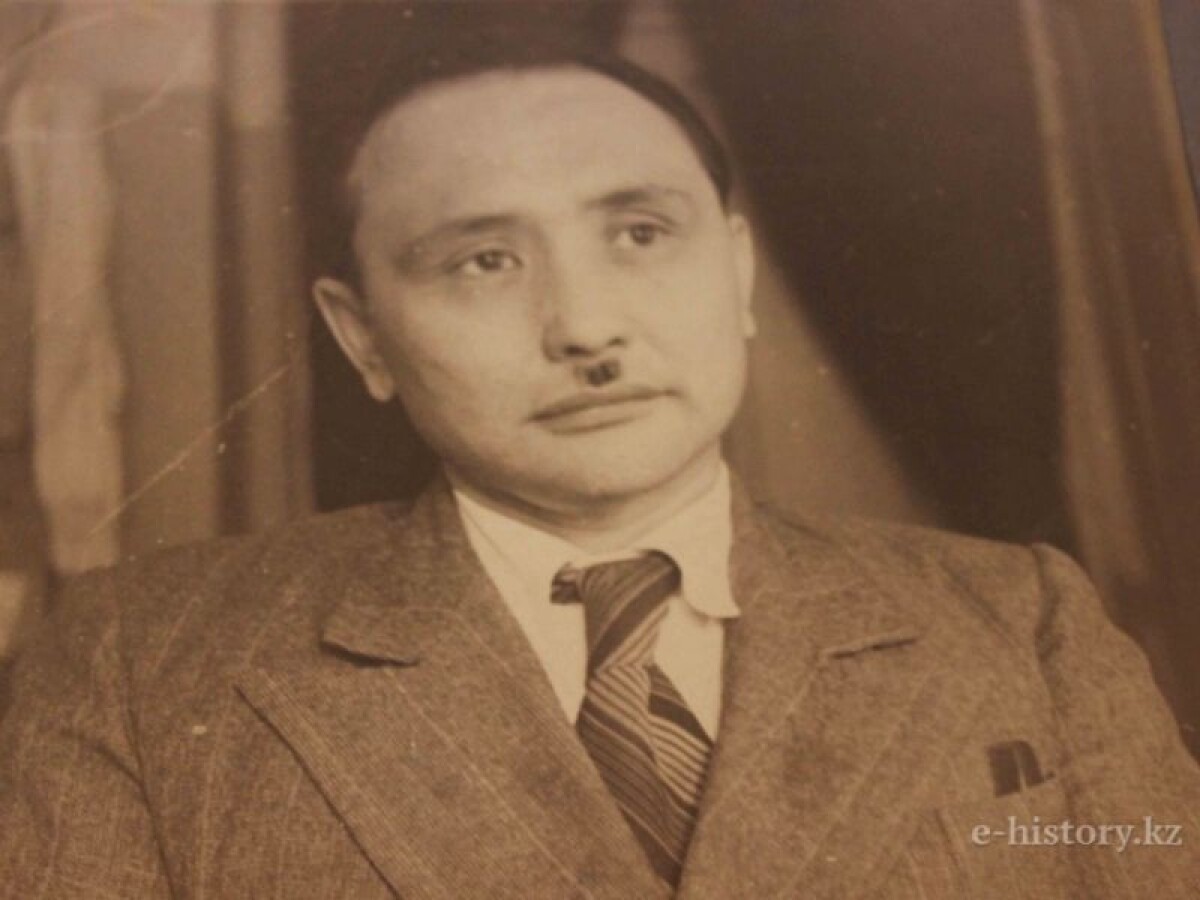
The kind of words of the respected writer Talgat Kenesbay helped to embody our idea into reality. Thus, we visited Mariyam Shashkina’s house – a wife of Zein Shashkin. The entire wall of the hall is full of books, our eyes stopped on the historical photo hanging in the place of honor. Noticing it, the writer’s wife began her story with description of this photo.
‘My grandfather ‘felt maker Biseke’
‘A name of the felt maker Biseke is mentioned in the epic novel of Mukhtar Auezov ‘The Path of Abai’. He was one of the high-powered rich people in Semipalatinsk region. Many people knew him as the owner of the felt factory. My father Nurlan was a wealth man as well. I have not seen my father after he died in 1928.
It was difficult time, when Kazakh bais suffered a disaster. My father and his brother were pursued under pretense of confiscation, later they did not escape from the repression. There was none of the men in the house, only girl and the only person who was able to do the work – my mother Kaliman. In 1932, when the famine began, my relatives by the maternal side lived in the village near Semipalatinsk. They lived their native village in this difficult time, and moved to our city. Those events hardly preserved in my memory: those, who were able to open the heavy doors of our house survived and the rest, weakened and exhausted by hunger, died. A lot of people died from starvation, many people did not survive this tragedy. I still shudder when remember about it’.
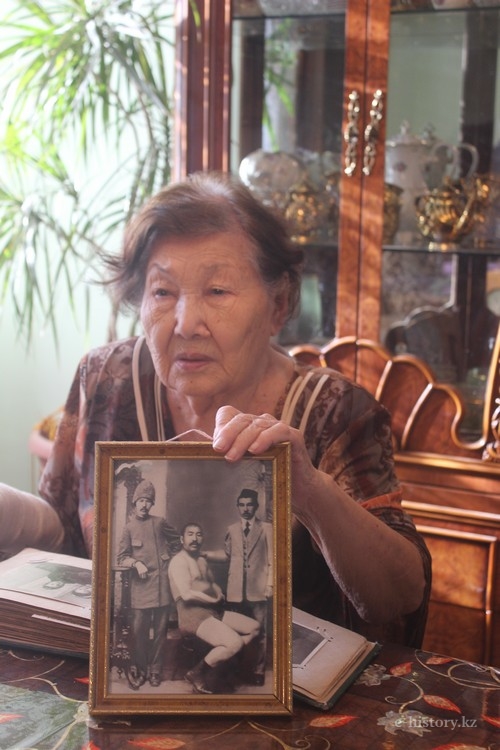
Meat-preserving factory in Semipalatinsk was the largest enterprise of that time. My mother, Kaliman found a job in the dining room of meet-preserving factory. There were hungry people near the food dump like ants, her daughter Mariyam remembers. ‘These people eat leftovers satisfying the hunger, My mother, who saw all this, tried to put dough and bread to the trash and therefore, helped the most hungry people’.
‘My father was Kazhy Mukan’s close friend’
‘I know about my father Nurlan Bisekeyev a little. One artist, who is our relative, found this photo in the Central State Archive. He came across to this inconspicuous old photo working in the archive. He had questions ‘Who is he, where did he come from? Who was he?’ and he started to look for information about this young man from a self-portrait. He found a piece of paper with the photography, where his names, last name, name of study in old Slavonic language on specialty engineer were written. The image of the young man from yellowed photograph made him to take a pen and draw his portrait. After finishing the painting, he brought it to the Writers’ Union. My nephew Erlan Aituarov was interested in it. He was an artist as well. Then he asked an author of the portrait:
-Who is he? Did you write his name and last name?
-I wrote it down. It is written ‘Bisekeyev Nurlan Bisekeyevich’ on the back side,-he replied.
-Then, it is my grandfather! – Erlan exclaimed.
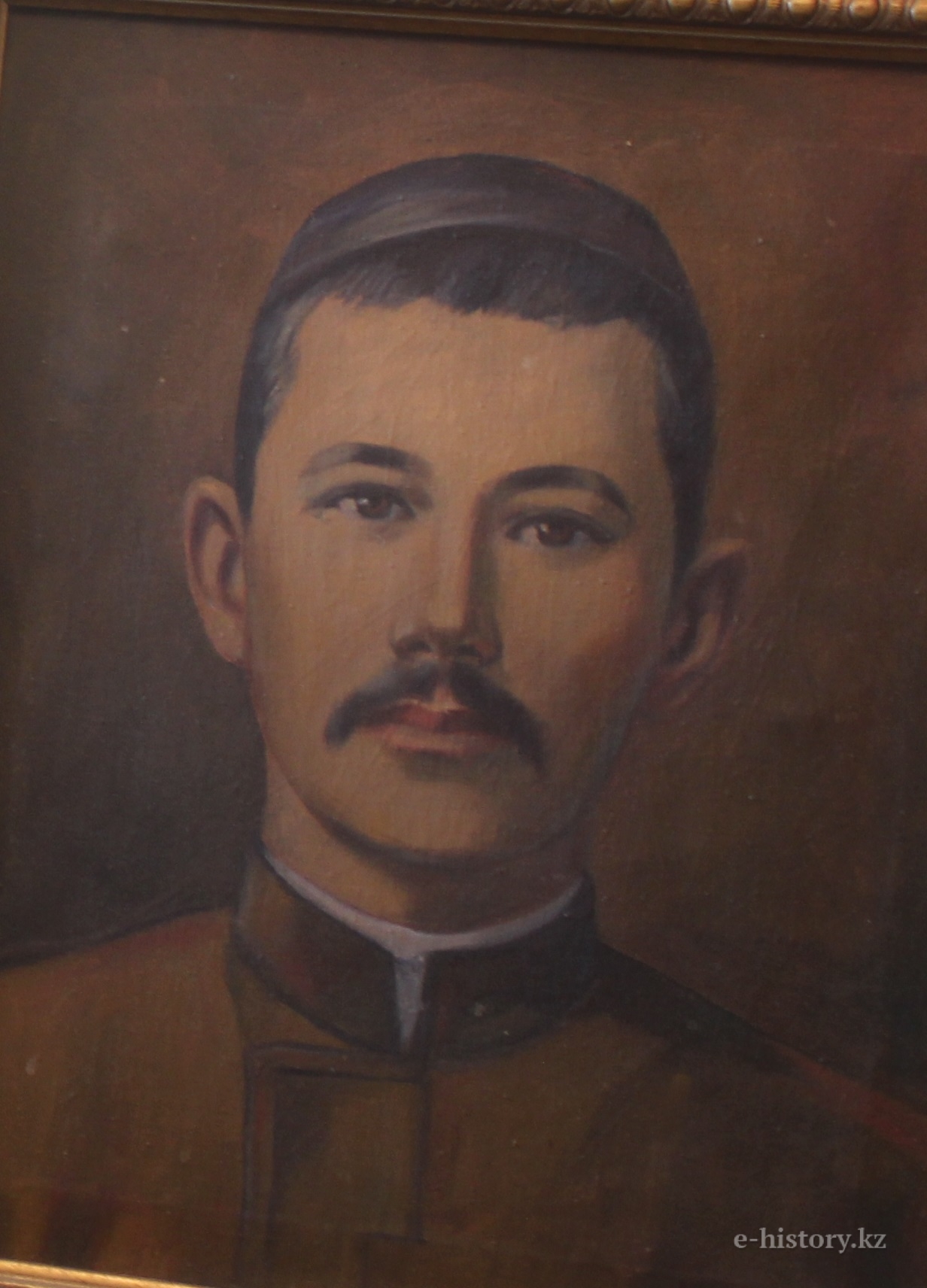
The people next to him were surprised and could not believe it. Erlan said that his mother’s father was Nurlan and her sister lived in Alma-Ata and he knew about his grandfather a little. So, I acquired the only photo of my father thanks to unfamiliar, but good people with pure hearts.
In 1914, a big fair that informed everyone on upcoming feast was held Nizhny Novgorod. The rich, wealthy people gathered at the feast, my father was among them too. They were not ordinary Kazakhs, they were educated and enlightened people. Kazhy Mukan also attended that fair, his fight with German Schmidt was declared before it. He knew about Mukan’s origin and required a rate of 100 rubles to fight against him. It was unexpected. Kazhy Mukan sat down, but the gathered people applauded him and the buzz raised. He was unable to withstand the pressure, jumped into the arena and shouted:
-Hey, Muslims, where are you? If you are here, give me 100 rubles. This Schmidt makes such conditions!
Then, two brothers Nurlan and Abdolla, who were sitting in the hall, ran at the same time and gave two hundred rubles to Kazhy Mukan. Our baluan immediately defeated German and won. When the people dismissed, he ran in search of two brothers who supported him. When he found them, he expressed his deep appreciation and invited them to take photo together.
Mariyam’s father, young Nurlan Bisekeyev continued to maintain close relationship with a well-known baluan after that case, which turned into strong friendship later. Everytime, when Kazhy Mukan came to Semipalatinsk, he stayed with Nurlan and Abdolla, showed plays and listened to songs of a famous singer Amre.
'The life along Zeke is like a dream'
We decided to dedicate the following words of 87-year old Mariam to her dear spouse, who remembered the events of past years with special tremor. When we asked ‘How did you get acquainted with Zein, writer Zein Shashkin?’, Mariam started to respond with enthusiasm.
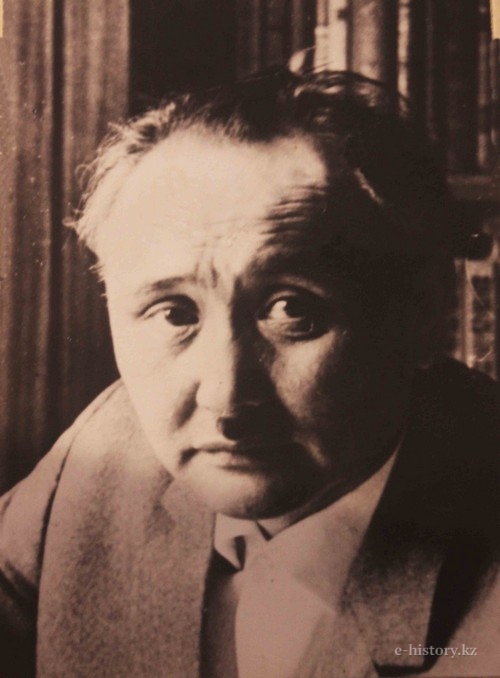
‘I called Zein as Zeke. I did not live long with him. My ex-husband, returning from the war, died of severe wounds and stayed alone with four children. Zeke appeared in this hard time for me. My close friend was his niece. She invited him to my house and when he saw me, said to his sister:
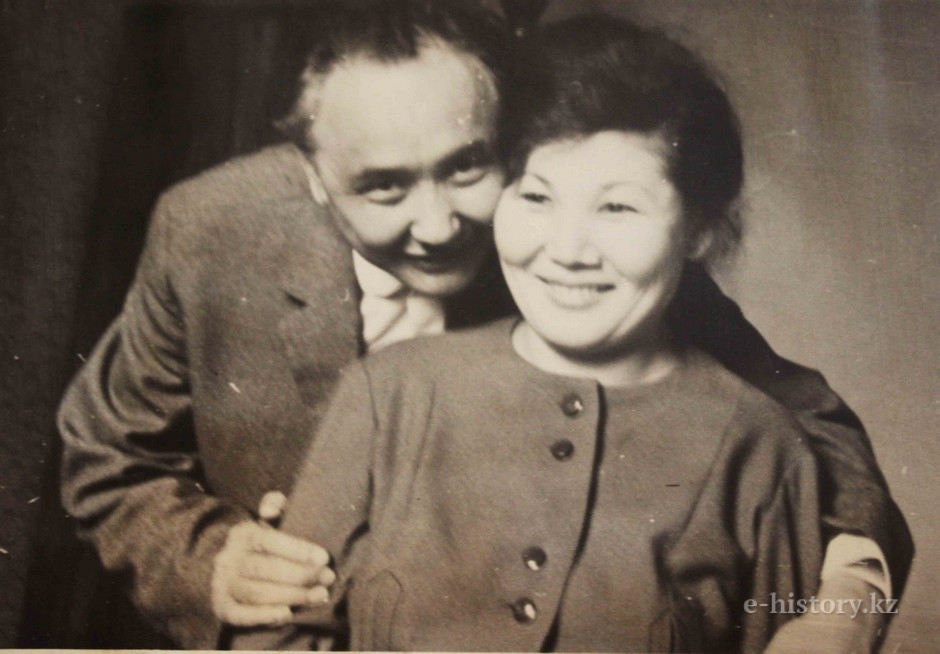
-Make, now you have no need to introduce me to anyone. I consider, he was introduced to many girls and he did not like anyone. When he saw me, he understood that he met a soulmate.
It was the fate. I sat at home caring about children and then I immersed into new life. My situation improved, I got into the academic environment, began to attend literary events and met many famous people’.
‘The writer was fond of children’
‘Zeke was of medium height and slender. His nature was wonderful. He did not raise voice to anyone, especially he was fond of children. He talked and consulted with them like adults. He loved my children from my ex-husband as they were his own ones. He always said to youngest Sabyr that he was his son. He gave his name, entrusted the work and treated as he was his son. When Zeke died Sabyr grieved a lot. Zeke was a wonderful father. He said to my eldest son ‘let’s write your father’s name, he had no sons’. He said about another son: ‘his father was a real man, you should take his name’. However, she was unable to hide her regret: she distracted a writer, who wanted to change children’s last names by other things. Now it is late and only youngest son has Shashkin’s surname. Mariam admitted that it was her fault.
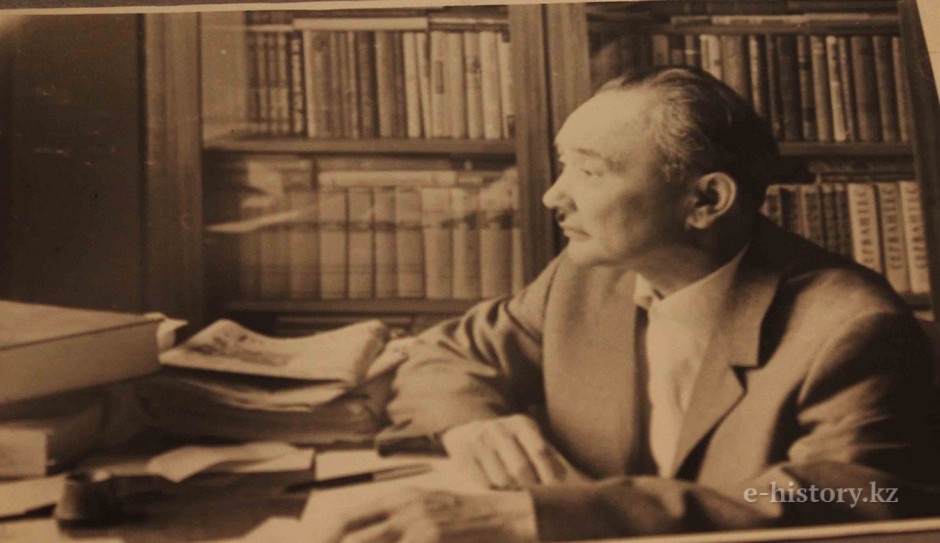
Our daughter Gulzhan was one and half year, when her father died. She is real daughter of Shashkin’.
Zeke had a wonderful character. He survived many difficulties. He was subjected to harassment, bullying, assault by investigators. They broke his ribs, knocked tooth out. Even he kept his ground, he did not admit guilt. ‘I grew up and studied in the Soviet Union, how could I be ‘enemy of the people’, - he replied. The punitive system condemned him to 17 years and sent to Kolyma. At that time, he was the head of the department of Semipalatinsk Pedagogical Institute, but NKVD executioners handcuffed him in front of the students. He served time in prison with U.Turmanzhanov, M.Karatayev.
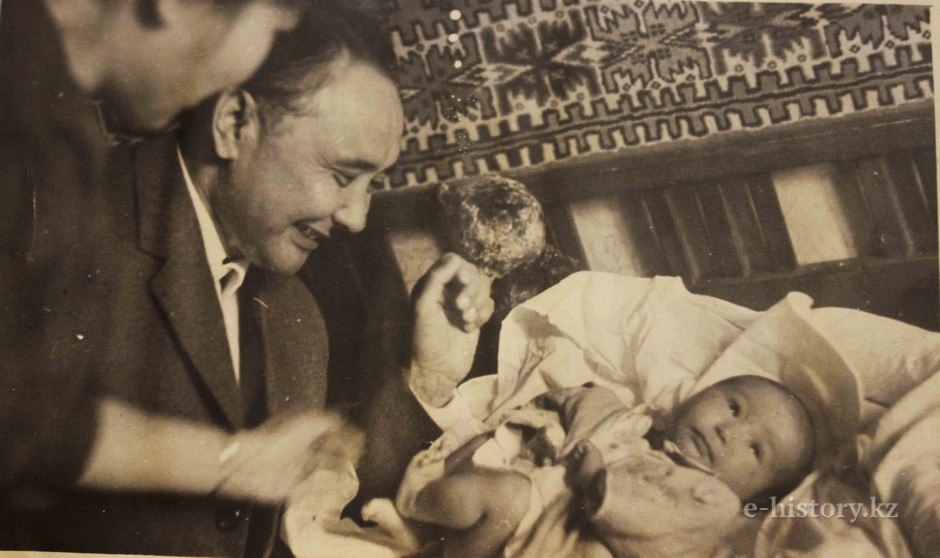
As I mentioned before, Zeke loved children very much. When Gulzhan was born, he did not allow anyone to see her. His character was strange. He thought that someone could bedevil her. He poured the water and other drinks on his hand, and he measured temperature in this way. He forbade giving anything to his daughter. He worried that all sorts of germs can be infectious for the child. As she was the only girl in the family, the boys wanted to see and touch her. Zeke was standing near Gulzhan and said: ‘Do not come closer, you will spread microbes, kiss her heel’.
‘He was engaged in writing after exile’
Zein Shashkin replaced literature by medical practice. Being in exile, he lived near the famous scientists and literary figures. The repressed greeted every dawn with hope in the walls of the camp. We wanted to know from Mariyam, how Zein ata became a doctor. ‘Probably, it is in his genes, Zeke began to treat people in the prison. He did not have any special qualification, but could easily treat any disease, because he knew it very well. After the war, Zeke wrote to the authorities in the prison ‘I must return to Kazakhstan’, ‘Kazakhstan needs me’. His wish came true in 1947,- M.Shashkina said.
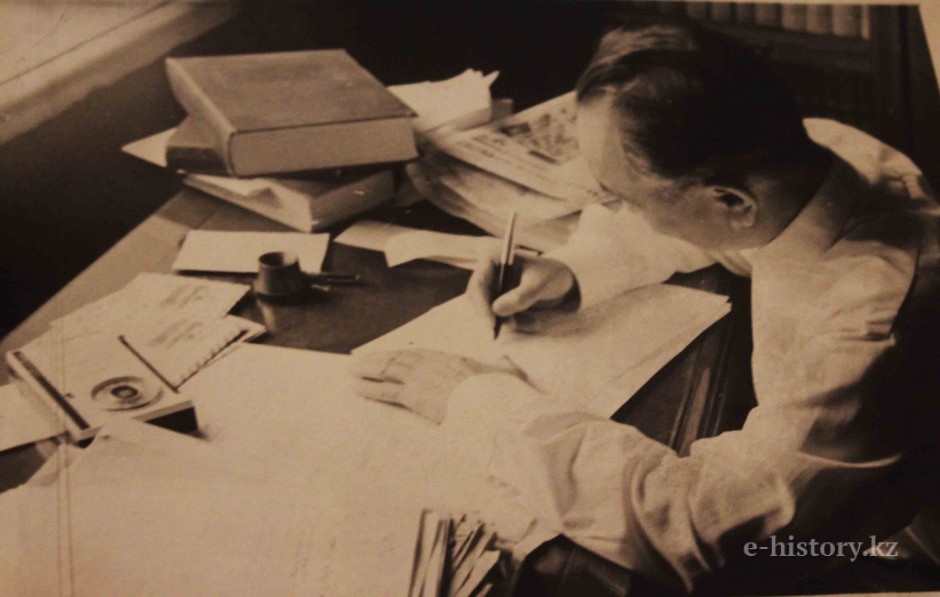
7-8 years were needed to recover the physical and mental condition of the writer, even those terrible years, spent in the prison remained far behind. He led reclusive life and lived near present Borovoe.
In the early 50s, he returned to Alma-Ata and was closely involved in literature.
‘Zeke stood from the table just to eat. After having a rest, he went back to his study. He did not walk in the evenings, except for long phone calls; he spent all his time writing something’.
Tokash Bokin’s life, who was a well-known person in the Soviet Kazakh history, formed the basis of Zein Shashkiin’s work. He wrote a big novel about Tokash Bokin after he studied his life and activity comprehensively. Zeke put a lot of efforts to establish the revolutionary’s bust near Panfilov Park. ‘One of the villages in Almaty region was named after Tokash Bokin and Auyezov theatre staged the writer’s play. He did not stop on it and made a feature film ‘Na rassvete’ (‘At the dawn’)’,-Mariyam said. This is what it means to devote the life to the cult figure. Active participation in public life not limiting with literature is a valuable tool for modern writers.
‘He sat at the table after he fully mastered and perceived the theme’
‘Zeke wrote very quickly, he could think a lot. He read quickly as well, started book was read easily. He quickly wrote his works so he had published 5 novels in 5 years. He covered different themes in his works, however, a kind of writer’s handwriting is clearly seen’, - Mariyam said.
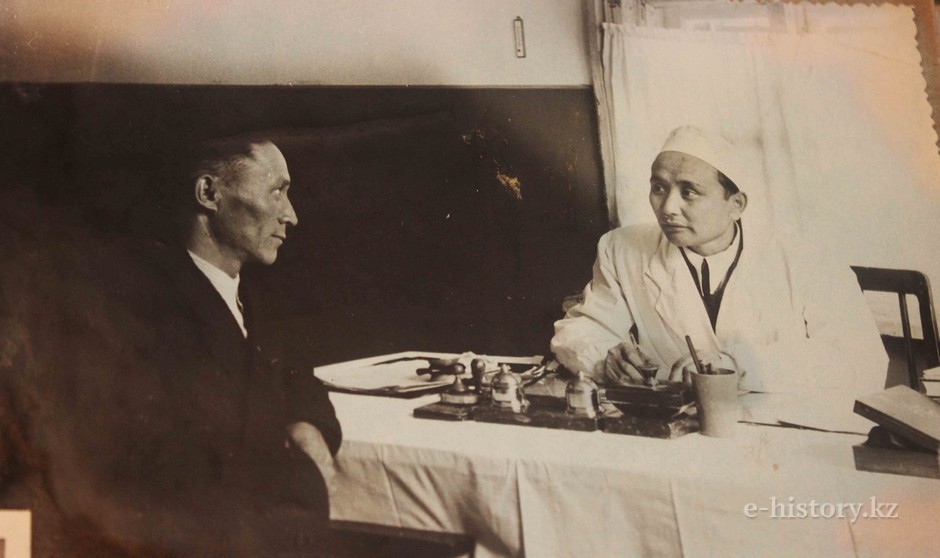
‘Dr.Darkhanov is the first novel about domestic medicine in the national literature. In 2006, the book was included in the golden fund. I was a witness how he wrote his latest novel ‘Doverie’ (‘Trust’). When he was working, there was silence, so you could not hear a fly. We created such atmosphere for him. He always said: ‘I will write a lot of works, so I need to rest. One day I crept behind and began to observe how he was writing. He knew that I was standing by, but he continued writing, words just flowed from his brush. I was very surprised.
Nobody is looking for Zeke, everybody forgot about him. Both contemporaries and young people do not remember him. There was rivalry among the writers and there were those, who envied Zeke’s talent. There was no writer, who wrote five different novels after exile. The modern generation speak about Sabit Mukanov, Abdizhamil Nurpeissov, but nobody can be compared to Zeke. Zein was very educated, cultural literate writer’. We, as representatives of future generations, saw the truth with own eyes, so we could not argue, but silently nodded. Actually, it meant to be so.
'When Zeke died…'
Mariyam, turning the pages of the photo album, that kept happy and sorrowful moments of the life, showed photos from writer’s funeral. We saw that there were G.Musrepov, G.Mustafin, A.Sarsenbayev, S.Begalin, A.Sharipov, K.Orazalin and many other writers at the farewell ceremony.
‘When Zeke died, the first, who expressed condolences, was a hero Bauyrzhan Momyshuly. He came home and stood at the head of Zeke’s bed. There was a gray hat on his head that hid his grey hair, he took it off and lowered his head. ‘You were a real man, Zeke’, -he said. Those Bauyrzhan’s words remained in my memory forever’,- Mariyam said.
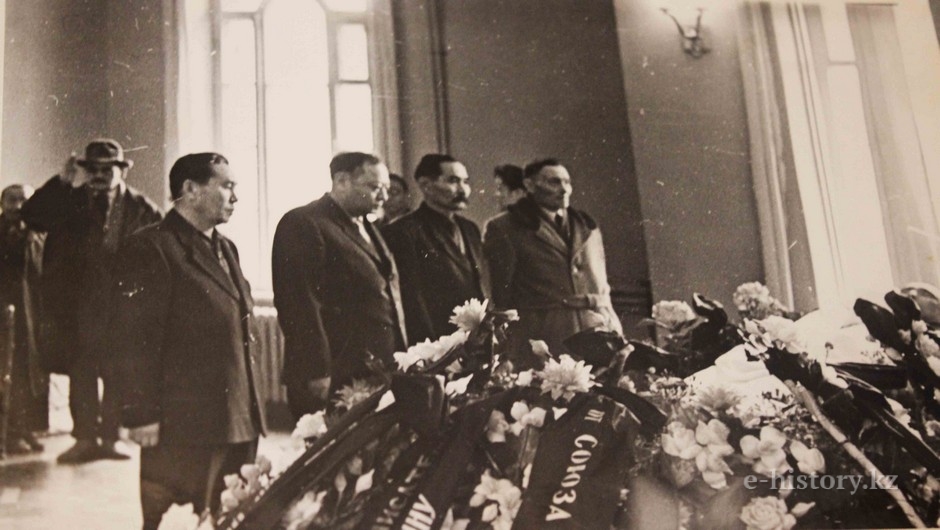
Mariyam also said that she sang zhoktau when the writer died. Mariyam did not realize it, when it was quiet, the relatives told her about it. All people were surprised, how a girl with Russian education from the city, Mariyam was able to sing such a mournful song. ‘It was a sincere song, not song, but a soulful mystery I had not shared with anyone and sorrow for my dear spouse, deceased prematurely’,- Mariyam admitted in tears. We did not notice how the time passed quickly during our meeting with Mariyam.
We do not say that we covered the writer’s life completely during those one and half hour. We just knew the details we were interested in. Being from a noble family, she experienced many difficulties in her life and those 3 years that she spent with the writer were the happiest ones for her. We noticed a heavy sigh, a bitter tear, sob, choking throat during the story about her life. It was not a secret that children and other relatives of the writer raised a quarrel for inheritance, the fact that he survived the black rivalry of colleagues and all those precious photos and memorable items transferred to the museum, were stolen. Finally, we wished all the best Mariyam Shashkina for the interesting story and left the house.
By Zangar KARIMKHAN
